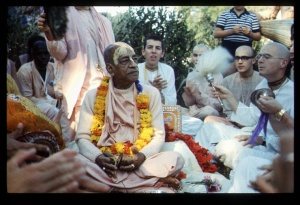SB 2.7.10

A.C. Bhaktivedanta Swami Prabhupada
TEXT 10
- nābher asāv ṛṣabha āsa sudevi-sūnur
- yo vai cacāra sama-dṛg jaḍa-yoga-caryām
- yat pāramahaṁsyam ṛṣayaḥ padam āmananti
- svasthaḥ praśānta-karaṇaḥ parimukta-saṅgaḥ
SYNONYMS
nābheḥ — by Mahārāja Nābhi; asau — the Personality of Godhead; ṛṣabhaḥ — Ṛṣabha; āsa — became; sudevi — Sudevī; sūnuḥ — the son of; yaḥ — who; vai — certainly; cacāra — performed; sama-dṛk — equibalanced; jaḍa — material; yoga-caryām — performance of yoga; yat — which; pāramahaṁsyam — the highest stage of perfection; ṛṣayaḥ — the learned sages; padam — situation; āmananti — do accept; svasthaḥ — self-reposed; praśānta — suspended; karaṇaḥ — the material senses; parimukta — perfectly liberated; saṅgaḥ — material contamination.
TRANSLATION
The Lord appeared as the son of Sudevī, the wife of King Nābhi, and was known as Ṛṣabhadeva. He performed materialistic yoga to equibalance the mind. This stage is also accepted as the highest perfectional situation of liberation, wherein one is situated in one's self and is completely satisfied.
PURPORT
Out of many types of mystic performances for self-realization, the process of jaḍa-yoga is also one accepted by authorities. This jaḍa-yoga involves practicing becoming like a dumb stone and not being affected by material reactions. Just as a stone is indifferent to all kinds of attacks and reattacks of external situations, similarly one practices jaḍa-yoga by tolerating voluntary infliction of pain upon the material body. Such yogīs, out of many self-infliction methods, practice plucking out the hairs on their heads, without shaving and without any instrumental help. But the real purpose of such jaḍa-yoga practice is to get free from all material affection and to be completely situated in the self. At the last stage of his life, Emperor Ṛṣabhadeva wandered like a dumb madman, unaffected by all kinds of bodily mistreatment. Seeing him like a madman, wandering naked with long hair and a long beard, less intelligent children and men in the street used to spit on him and urinate on his body. He used to lie in his own stool and never move. But the stool of his body was fragrant like the smell of fragrant flowers, and a saintly person would recognize him as a paramahaṁsa, one in the highest state of human perfection. One who is not able to make his stool fragrant should not, however, imitate Emperor Ṛṣabhadeva. The practice of jaḍa-yoga was possible for Ṛṣabhadeva and others on the same level of perfection, but such an uncommon practice is impossible for an ordinary man.
The real purpose of jaḍa-yoga, as mentioned here in this verse, is praśānta-karaṇaḥ, or subduing the senses. The whole process of yoga, under whatever heading it may be, is to control the unbridled material senses and thus prepare oneself for self-realization. In this age specifically, this jaḍa-yoga cannot be of any practical value, but on the other hand the practice of bhakti-yoga is feasible because it is just suitable for this age. The simple method of hearing from the right source, Śrīmad-Bhāgavatam, will lead one to the highest perfectional stage of yoga. Ṛṣabhadeva was the son of King Nābhi and the grandson of King Āgnīdhra, and he was the father of King Bharata, after whose name this planet earth was called Bhārata-varṣa. Ṛṣabhadeva's mother was also known as Merudevī, although her name is mentioned here as Sudevī. It is sometimes proposed that Sudevī was another wife of King Nābhi, but since King Ṛṣabhadeva is mentioned elsewhere as the son of Merudevī, it is clear that Merudevī and Sudevī are the same person under different names.